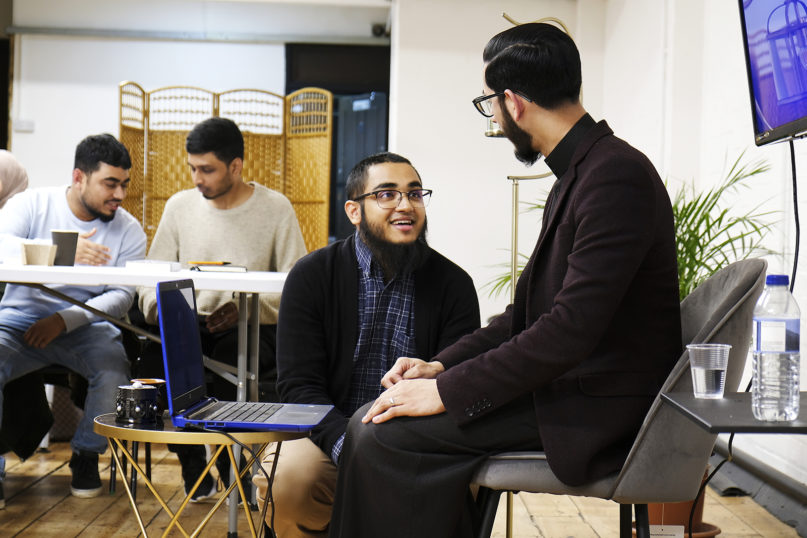LONDON (RNS) — Hamidah Khanom had never felt any particular interest in traditional Islamic learning. Yet there she and about 40 other young Muslims sat, drinking tea and chatting in a makeshift classroom as they awaited the first session of a weekly course on tafsir, or Quranic exegesis.
“I feel like people ask me questions about religion, and when I don’t necessarily have the answers then it’s a bit embarrassing,” said Khanom, who recently graduated and started her first full-time job. “So I figured I want to have that knowledge for myself.”
But Khanom doesn’t feel like she fits in at most mosques, in part because of the way she dresses. Plus, her local mosque doesn’t offer a space for women, so she has to trek across the city to the East London Mosque’s Maryam Centre in order to have questions answered, attend programs or pray in congregation. As a result, she only attends during the holy month of Ramadan.
Joining the tafsir course hosted by Faith — a new spiritual community hub for young Muslims, which she and many of her classmates discovered while scrolling through Instagram — felt like a more approachable alternative.
“This is me gaining that religious knowledge before I go back to the mosque, eventually,” Khanom said. “This is a way for me to reconnect with my deen (faith).”
Founded by three young Muslim men in London one year ago, Faith offers a community space that facilitates spiritual growth while prioritizing fellowship, openness, accessibility and relevance, the initiative’s co-founders explained.
“The reality is that there is a disenfranchised kind of feeling people may have, and because of religious trauma or a bad experience, they don’t feel welcome in the masjid or other Muslim spaces,” co-founder Sheikh Hasib Noor explained. “People feel like their voices are not being heard, or that the relevance wasn’t there, or their spiritual needs are not being met. We felt like we could provide that to people with an environment where the social is just as important as the spiritual.”
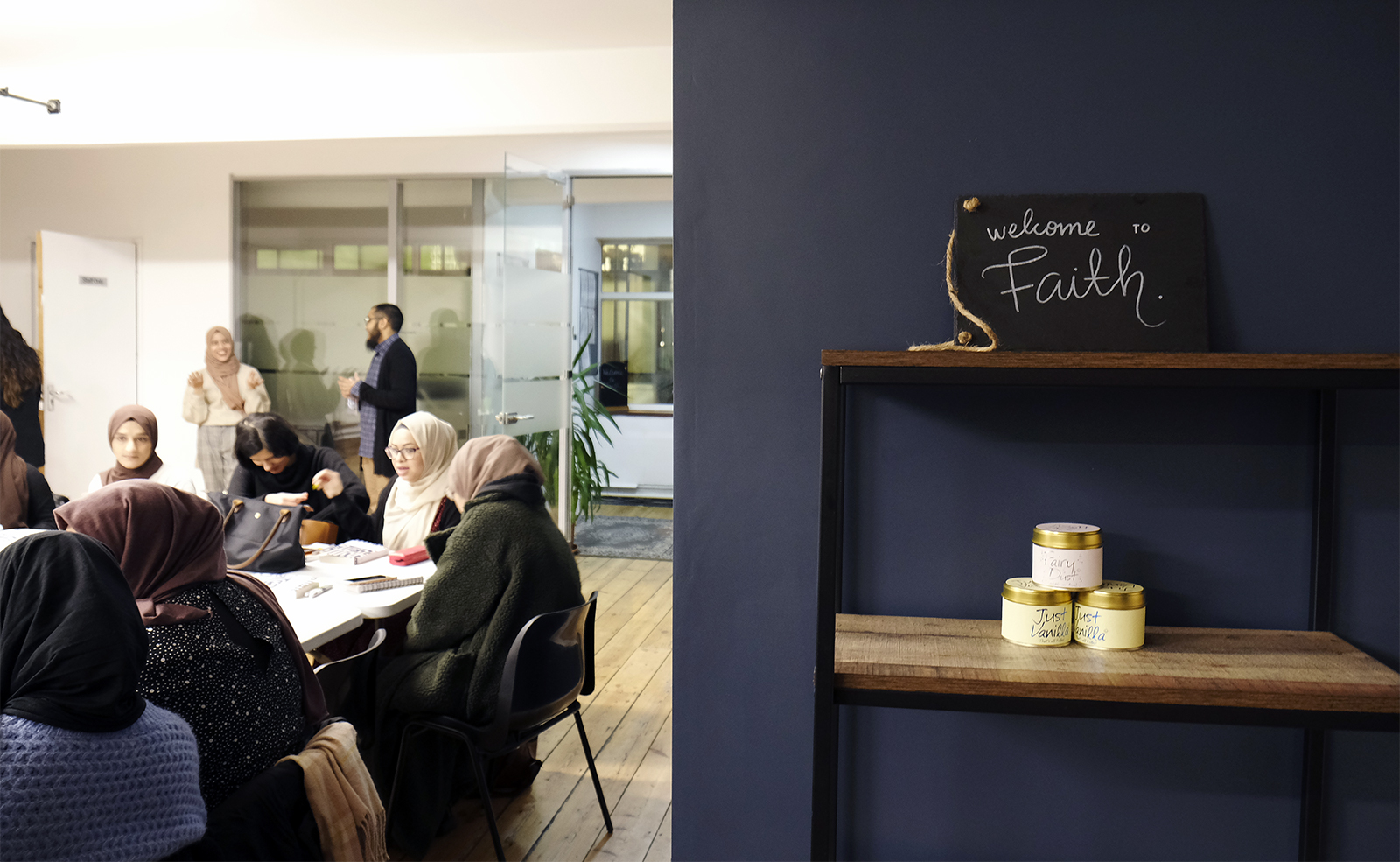
People gather for the introductory session of a new course on tafsir, or Quranic exegesis, held Jan. 27, 2020, at the new permanent space for the Faith community in London. RNS photo by Aysha Khan
Directed by Noor with his co-founders Imam Shabbir Hassan and Adel Chowdhury, the initiative is growing rapidly and has just emerged from its soft launch. This month, the organization hosted its grand opening at its newly secured permanent space, held its first monthly seminar and introduced its first ongoing modular course.
In a city filled with hundreds upon hundreds of mosques, Faith’s founders had no interest in creating yet another one. Nor did they have any interest in stealing away congregants.
Instead, Hassan said, they’re trying to create a gathering space for what he described as the “literally 95% of the Muslim community” that he said has been neglected by the city’s existing mosques, Islamic organizations, conferences and events.
In London, there are many formal institutes of Islamic learning — including Q-Iman, where Hassan teaches — as well as social and professional networking events for Muslims. But the co-founders, along with dozens of other members now attending Faith events, found themselves instead tuning in every Monday night to Heartwork, a popular lecture series aimed at young Muslim professionals and led by Imam AbdelRahman Murphy of Irving, Texas.
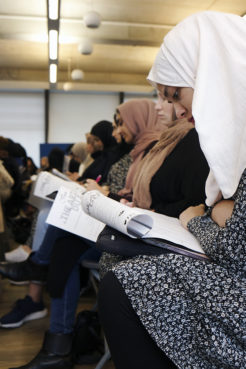
Women take notes during a Faith community seminar called “The Art of Du’a,” or prayer, held Jan. 25, 2020, at the Osmani Trust in London. RNS photo by Aysha Khan
For years, all three co-founders had wondered individually about finding a way to bring something similar to London. It wasn’t until one day when Noor, Hassan and Chowdhury were driving in a car together that they realized that, through their combined religious training and community development experience, they could build their own version.
It took just two weeks for them to pull together their first event, focused on practical spirituality and modeled after the Roots Community Space, founded by Murphy two years ago in Texas.
Roots is one of a growing number of so-called third spaces set up to foster spiritual and social community growth among millennial Muslims beyond the traditional mosque environment. The U.K. does have a small handful of such alternative sacred spaces, from Rumi’s Cave in London to the convert-focused Crescent Centre in Cardiff, Wales, and the women-led Inclusive Mosque Initiative.
Noor pointed out that Faith’s organizational model is not unique, but its leaders are focused on building a structure that can easily scale up.
The initiative has already expanded to North America, as well, with a network of independent locations set up in Ottawa, Ontario; San Diego; and Austin, Texas. A New York City location launched just this week with a session on practical spirituality led by spiritual facilitator Abdelrahman Badawy.
Each location mirrors the structure of Faith’s London space, with a trained spiritual facilitator leading relevant programming aimed at young Muslim men and women.
“It’s an outlet for Muslims who can’t express themselves in the masjid or don’t feel comfortable there,” said Muntasir Sayeedi, who’s co-director of the New York City location. “You don’t hear many masajid (mosques) talking about burnout. The masjid will always remain sacred as the house of Allah, but those running the masjid can end up pushing people away from the faith. We want to redefine what a spiritual space is.”
“New York City has a really large Muslim community. It’s really that there are pockets of communities throughout the city,” his co-director Arva Anees said. “With Faith we want to bring these different pockets of Muslims with different backgrounds, cultures and lifestyles together in one space to learn from each other. … I hope it can function as a place where Muslims can learn how to treat one other.”
In each location, Faith’s programming is centered on spiritual growth and religious learning, but also focuses on creating community bonds. The first hour of each event is reserved for tea and socializing, and each session ends with an open Q&A with its spiritual facilitator. In the middle is a session on “relevant spirituality,” Hassan said, “all in English, with no jargon or technical terms, just giving everyone access to Quran and tafsir.”
While most institutes in London require students to have an intensive knowledge of Arabic previously, Faith’s programming has no such requirements. In its first-ever modular course on tafsir — dedicated to dissecting the Quranic chapter Surah Maryam, named after Jesus’ mother, Mary, as a nod to the mostly female audience — about half of the attendees said it was their first time in any sort of tafsir class.
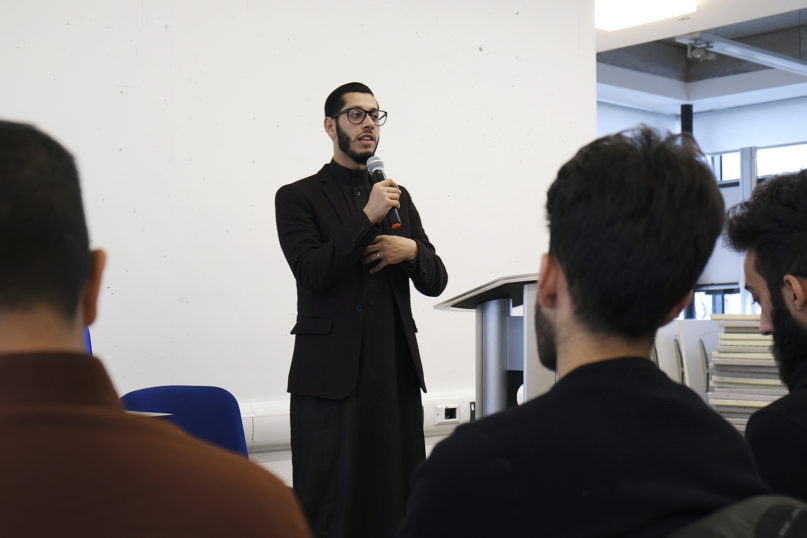
Imam Shabbir Hassan lectures during a Faith community daylong seminar called “The Art of Du’a,” or prayer, held Jan. 25, 2020, at the Osmani Trust in London. RNS photo by Aysha Khan
“For the first time we’ve opened up those doors of learning to everyone,” Hassan said. Seats fill up quickly at most programs they host, with between 80 and 120 attendees on average, and organizers regularly field last-minute requests for entry until minutes before events begin.
Over the next few months, organizers plan to turn their new permanent space in East London into a community hub with a book club, women’s only events, programs for teens, events for mothers and their children, and short taraweeh prayers with reflections in English during Ramadan.
Organizers say Faith is particularly aimed at offering a nonjudgmental and welcoming environment for those who may feel uncomfortable at their local mosque: converts who are still learning to navigate Islamic rituals, people who require English-language programs, people with tattoos and piercings, men without beards, women who don’t wear hijab, and any Muslim who feels unrepresented.
Faith’s tagline, quoted in countless social media posts alongside emojis of brown-skinned prayer hands, drives the message home: “Come as you are, to faith as it is.”
In that way, Hassan said, he hopes to build young British Muslims a bridge back to traditional Islamic spaces.
“We hope we can connect with the masajid that are already out there, and start gently pushing people toward the mosque,” he said. “Because obviously there’s a disconnect, and we want to bridge that gap. We want to get people to a level where they’re comfortable going to a mosque and continue coming to us.”
Indeed, a welcome but unintended consequence of Faith’s model has been providing a community of young Muslim women with a rare space to socialize, engage in religious learning and ask a trained imam their questions directly, with no barrier between them.
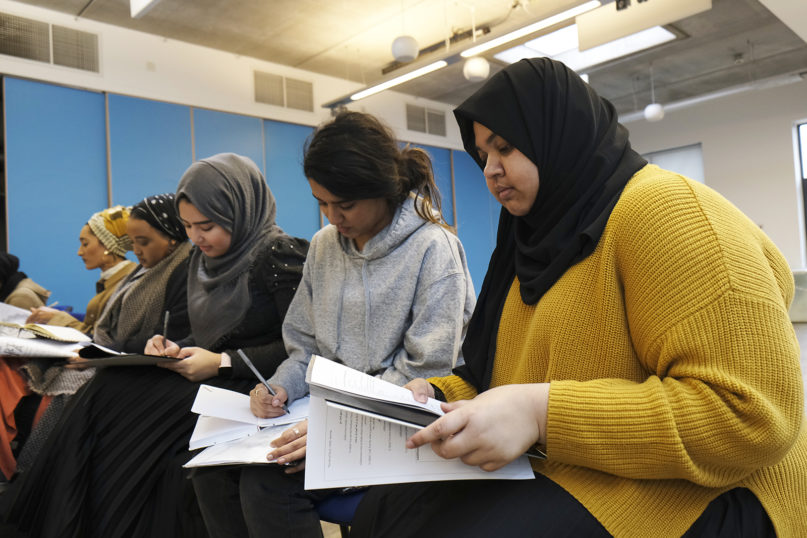
Ayesha Khanom, right, a volunteer with Faith, takes notes in the audience during a Faith community seminar called “The Art of Du’a,” or prayer, held Jan. 25, 2020, at the Osmani Trust in London. RNS photo by Aysha Khan
At every Faith event, women comprise a sweeping majority of the attendees. To accommodate them, Faith is bringing on a female spiritual adviser in the next few months and has set up walking groups to make attendees feel more comfortable making their way back to the train station when events end at night.
“Most of the Islamic spaces here in the U.K. are quite traditional and conservative, and there’s not a lot of space for women,” said Ayesha Khanom, a primary school teacher who was studying Arabic under Hassan before he launched the space and is one of about 50 volunteers for Faith. “But in Islam, it doesn’t matter who you are, or what your background is, there’s space for you. So in Faith, there’s also space for you.”
That has left some Muslims who believe in strict separation of the genders uncomfortable.
“Some people come to the space, they literally walk in, look around, see that there’s no barrier between men and women and they walk straight out,” Noor noted. “We see this regularly.”
Separation of the genders happens at Faith events, but it occurs organically, with men typically filling in one row and women claiming the rest. There are no physical barriers in place, and women are encouraged to participate fully and ask questions. Most of Faith’s crew of volunteers are women, too.
In fact, Ayesha Khanom said, it was volunteering with Faith that put her on the road back to connecting with Islam after years of feeling distant.
“Faith is becoming a place where people can start their journey to finding Islam again,” she explained. “We don’t want to be an endpoint for anybody.”
